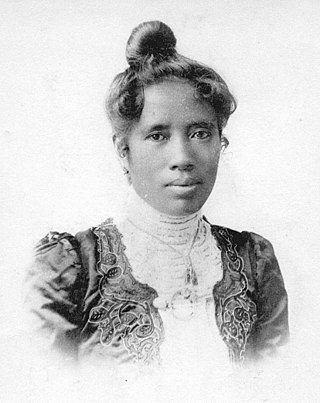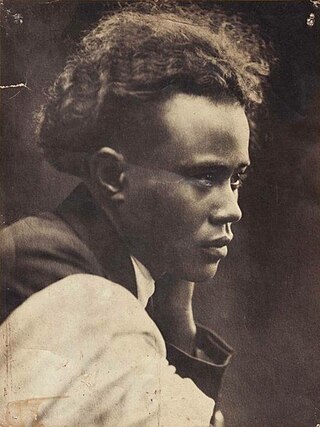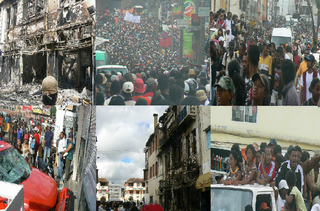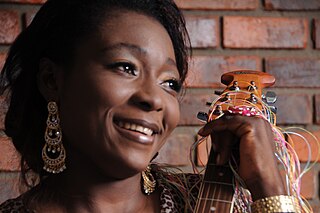
Madagascar, officially the Republic of Madagascar, is an island country lying off the southeastern coast of Africa. It is the world's fourth largest island, the second-largest island country and the 44th largest country in the world. Its capital and largest city is Antananarivo.

The history of Madagascar is distinguished clearly by the early isolation of the landmass from the ancient supercontinent of Pangaea, containing amongst others the African continent and the Indian subcontinent, and by the island's late colonization by human settlers from the Sunda islands and from East Africa. These two factors facilitated the evolution and survival of thousands of endemic plant and animal species, some of which have gone extinct or are currently threatened with extinction. Trade in the Indian Ocean at the time of first colonization of Madagascar was dominated by Indonesian ships, probably of Borobudur ship and K'un-lun po types.

Antananarivo, also known by its colonial shorthand form Tana, is the capital and largest city of Madagascar. The administrative area of the city, known as Antananarivo-Renivohitra, is the capital of Analamanga region. The city sits at 1,280 m (4,199 ft) above sea level in the center of the island, the highest national capital by elevation among the island countries. It has been the country's largest population center since at least the 18th century. The presidency, National Assembly, Senate and Supreme Court are located there, as are 21 diplomatic missions and the headquarters of many national and international businesses and NGOs. It has more universities, nightclubs, art venues, and medical services than any city on the island. Several national and local sports teams, including the championship-winning national rugby team, the Makis, are based here.

Ranavalona III was the last sovereign of the Kingdom of Madagascar. She ruled from 30 July 1883 to 28 February 1897 in a reign marked by ultimately futile efforts to resist the colonial designs of the government of France. As a young woman, she was selected from among several Andriana qualified to succeed Queen Ranavalona II upon her death. Like both preceding queens, Ranavalona entered a political marriage with a member of the Hova elite named Rainilaiarivony, who largely oversaw the day-to-day governance of the kingdom and managed its foreign affairs in his role as prime minister. Ranavalona tried to stave off colonization by strengthening trade and diplomatic relations with foreign powers throughout her reign, but French attacks on coastal port towns and an assault on the capital city of Antananarivo led to the capture of the royal palace in 1895, ending the sovereignty and political autonomy of the centuries-old kingdom.

Marc Ravalomanana is a Malagasy politician who served as the sixth President of Madagascar from 2002 to 2009. Born into a farming Merina family in Imerinkasinina, near the capital city of Antananarivo, Ravalomanana first rose to prominence as the founder and CEO of the vast dairy conglomerate TIKO, later launching successful wholesaler MAGRO and several additional companies.

Jean-Joseph Rabearivelo, born Joseph-Casimir Rabearivelo, was a Malagasy poet who is widely considered to be Africa's first modern poet and the greatest literary artist of Madagascar. Part of the first generation raised under French colonization, Rabearivelo grew up impoverished and failed to complete secondary education. His passion for French literature and traditional Malagasy poetry (hainteny) prompted him to read extensively and educate himself on a variety of subjects, including the French language and its poetic and prose traditions. He published his first poems as an adolescent in local literary reviews, soon obtaining employment at a publishing house where he worked as a proofreader and editor of its literary journals. He published numerous poetry anthologies in French and Malagasy as well as literary critiques, an opera, and two novels.

Education in Madagascar has a long and distinguished history. Formal schooling began with medieval Arab seafarers, who established a handful of Islamic primary schools (kuttabs) and developed a transcription of the Malagasy language using Arabic script, known as sorabe. These schools were short-lived, and formal education was only to return under the 19th-century Kingdom of Madagascar when the support of successive kings and queens produced the most developed public school system in precolonial Sub-Saharan Africa. However, formal schools were largely limited to the central highlands around the capital of Antananarivo and were frequented by children of the noble class andriana. Among other segments of the island's population, traditional education predominated through the early 20th century. This informal transmission of communal knowledge, skills and norms was oriented toward preparing children to take their place in a social hierarchy dominated by community elders and particularly the ancestors (razana), who were believed to oversee and influence events on earth.

Andriana was both the noble class and a title of nobility in Madagascar. Historically, many Malagasy ethnic groups lived in highly stratified caste-based social orders in which the andriana were the highest strata. They were above the Hova and Andevo (slaves). The Andriana and the Hova were a part of Fotsy, while the Andevo were Mainty in local terminology.

The Merina Kingdom, or Kingdom of Madagascar, officially the Kingdom of Imerina, was a pre-colonial state off the coast of Southeast Africa that, by the 18th century, dominated most of what is now Madagascar. It spread outward from Imerina, the Central Highlands region primarily inhabited by the Merina ethnic group with a spiritual capital at Ambohimanga and a political capital 24 km (15 mi) west at Antananarivo, currently the seat of government for the modern state of Madagascar. The Merina kings and queens who ruled over greater Madagascar in the 19th century were the descendants of a long line of hereditary Merina royalty originating with Andriamanelo, who is traditionally credited with founding Imerina in 1540.

Andry Nirina Rajoelina is a Malagasy politician and businessman who has served as president of Madagascar since 2023. He previously served as president from 2019 to 2023, and was president of a provisional government from 2009 to 2014 following a political crisis and military-backed coup, having held the office of Mayor of Antananarivo for one year prior. Before entering the political arena, Rajoelina was involved in the private sector, including a printing and advertising company called Injet in 1999 and the Viva radio and television networks in 2007.

The 2009 Malagasy political crisis began on 26 January 2009 with the political opposition movement led by Antananarivo mayor Andry Rajoelina, which sought to oust President Marc Ravalomanana from the presidency. The crisis reached its climax in the 2009 Malagasy coup d'état when Andry Rajoelina was declared the president of the High Transitional Authority of Madagascar on 21 March 2009, five days after Ravalomanana transferred his power to a military council and fled to South Africa.

General elections were held in Madagascar on 20 December 2013, following a first round of presidential elections on 25 October. The presidential elections in December were a runoff between Jean Louis Robinson and Hery Rajaonarimampianina, the top two candidates to emerge from the first round of voting in October. The official results of the second round were announced on 7 January 2014 with Rajaonarimampianina proclaimed the victor with nearly 54% of the vote.

Mahaleo is a folk-pop band from Madagascar that is widely viewed as the most popular Malagasy group of all time. The band was founded by Dama with six of his classmates after first performing together during the rotaka student protests at their high school on 13 May 1972. Mahaleo's lyrics draw upon the indirect language of traditional hainteny and ohabolana to expose contemporary political and social issues and invite listeners to identify their own solutions.

Christianity in Madagascar is practiced by 85.3% of Madagascar's population according to the Pew Research Center in 2020. However, other surveys put the figure at 58%.

Hery Martial Rajaonarimampianina Rakotoarimanana is a Malagasy politician who served as the seventh President of Madagascar from 2014 to 2018, resigning to run for re-election.

Kolo Christopher Laurent Roger, commonly known as Roger Kolo, was Prime Minister of Madagascar from April 2014 to January 2015.
Joseph Albert Blaise Rabetafika was a Malagasy diplomat. He was Permanent Representative of Madagascar to the United Nations from 1969 to 1992, Malagasy Ambassador to Canada from 1970 to 1989, and Ambassador to Cuba from 1974 to 1992. In March 1985 and later in June 1986, he served as President of the United Nations Security Council.

Lynda Raymonde, was born on May 10, 1981, in Yaoundé, and is a Cameroonian Bikutsi singer from Lekié in the Centre region of Cameroon. She began her professional career in 2003, but became known on the national and international music scene in 2011 with her debut album Symbiose.
David Jaomanoro was a Malagasy writer, playwright and poet.

Berthe Rakotosamimanana was a primatologist and palaeontologist from Madagascar.

















